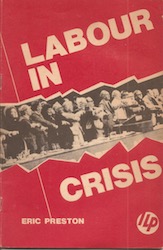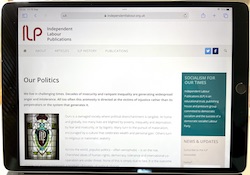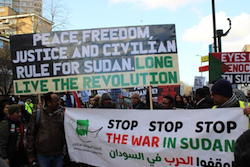With the world in crisis and the UK government floundering in response to the rise of the populist right both here and abroad, WILL BROWN assesses the challenge for the left and asks what it means for the ILP.
There is little doubt the world is in a tumultuous period of change, one that demands we take a step back to reconsider how we see the future – the future of the left in general but also of the ILP and its long-held perspective on capitalist society, liberal democracy, progressive change and the role of the Labour Party.
 Part of that involves thinking, in the short term, about how the current Labour government should respond to whatever is the latest body blow: the ceaseless directives and declarations from the White House, the challenge of racist nationalism, the electoral successes for the far right, or the heartbreaking devastation in Ukraine, Gaza and elsewhere.
Part of that involves thinking, in the short term, about how the current Labour government should respond to whatever is the latest body blow: the ceaseless directives and declarations from the White House, the challenge of racist nationalism, the electoral successes for the far right, or the heartbreaking devastation in Ukraine, Gaza and elsewhere.
However, in thinking about the future of the ILP and whether the approach outlined in Our Politics remains valid, we also need to look at broader changes underway, at how the left, broadly conceived, is responding to these, and how it should respond.
What follows is a brief introduction to the discussions and debates we need to have if we’re going to remain relevant to our emerging epoch. I’m going to look at three areas that need to be grappled with, although I am sure there are others that could be mentioned.
Many readers may challenge some of the characterisations I am going to make. Others may argue that the core of what the left stands for remains valid and any changes we make to our own perspective should be confined to updates, amendments and modifications rather than wholesale transformations. I suspect the problems we are grappling with go deeper than that, but I would be happy to be convinced otherwise.
My comments are divided into three broad groups:
- reflections on the world that Our Politics sought to change
- characteristics of the world we now face
- questions about what the changing world means for the left and for the ILP’s priorities.
1. Our Politics
First, I want to remind us where the ILP’s current political perspective came from. On rejoining the Labour Party in the 1970s, for much of the 1980s and on into the 1990s, the ILP’s politics were anchored in a class-based view of change. Although we rejected the more mechanistic and cruder Marxist views of the working class as the inevitable agent of historical change, we nevertheless held to a view that a renewed and re-imagined working class politics could drive a more radical Labour Party and, through that vehicle, change the country.
 Eric Preston described this process in Labour in Crisis as “a long and complex struggle to root socialist ideas in the Labour Party”, followed by “a long and hard struggle to win majority support for those ideas in the wider working class”.
Eric Preston described this process in Labour in Crisis as “a long and complex struggle to root socialist ideas in the Labour Party”, followed by “a long and hard struggle to win majority support for those ideas in the wider working class”.
Thatcherism, rapid social change, class fragmentation, the decline of trade unionism and of the old Labourite traditions, not to mention a series of election defeats – all served to undermine that approach.
The ILP responded in the 1990s, heavily in the shadow of Blairism, by rethinking our view of what socialist politics might look like, how it might gain broader appeal and how change might begin to be achieved.
At the core of that new approach, eventually published in 2003 as A Socialism for Our Times, was a commitment to radical democracy and an appeal that sought to reach beyond what had traditionally been seen as the natural constituencies for left wing politics. It was a perspective that saw “the need for socialism with a broader appeal”, maintaining that “a democratic agenda was central to any popular challenge to capitalist hegemony”, that a movement for progressive change needed “to confront anti-democratic capitalism with a radical democracy”.
The end of the Blair-Brown years and the return of Tory rule in 2010 initiated a third phase of rethinking about the ILP’s perspective, one driven chiefly by Barry Winter. It resulted in Our Politics, a statement first published in 2011 and subsequently revised a number of times as the political landscape shifted.
This was an attempt to respond to the limitations and legacies of Blairism (not least New Labour’s inability to challenge the core tenets of neoliberalism), as well as the financial crisis of 2008 and the weak response of left wing politics to that rupture. However, the new perspective did retain some important assumptions from the ILP’s earlier positions and it’s the continued adequacy of these that I want to question.
The first assumption is that our pursuit of socialism takes place in a fairly stable liberal democracy with a political culture that is largely conservative with a small ‘c’.
“In Britain,” we said, “that means we have to engage with the Labour Party”, adding: “We are sceptical of the notion that there is a ready-made progressive majority in the country waiting to be led. The electoral challenge facing radical parties will always be significant.”
Secondly, our political perspective is based on a critique of the capitalist economy, arguing that it is too liberalised and needs to be brought under greater public control, while the political system of liberal democracy is not democratic enough.
Thatcherism initiated four decades of “attacks on public, collective provision” during which “the free market has been promoted over state intervention”, a period that included Blair’s “accommodation to the neoliberal framework” and the Tories’ austerity agenda.
The third assumption behind our thinking is less obvious, but it’s there implicitly in the background and in subsequent articles and interventions.
This is that the UK – the main focus of our political project – exists within an international order that has remained more or less stable since the second world war. That world order includes the US as the predominant liberal power and some key institutions and organisations, many of which have promoted economic liberalisation. The assumption in the 1990s, after the Cold War ended, was that this order would expand as the world became increasingly westernised, liberalised and democratised.
My question is this: How far do those three assumptions underlying Our Politics still stand? Is that broad view still valid, or is the picture now far more mixed and troubling? If these assumptions no longer hold or can’t be counted on, what does that mean for the western left more generally and for the ILP in particular?
2. The world we now face
The world we are in is undergoing significant change and is increasingly unstable. Commentators, academics and even some brave politicians have attempted to define the nature of change, but continuous volatility and uncertainty mean bold sureties about the direction of travel are perilous.
i) Stable democracy and the two-party system
The fragility of liberal democratic systems is hard to ignore. The populist right in France, Germany, Hungary, Poland, the US and, increasingly, the UK, now openly challenges basic principles of citizenship, civil liberties and human rights once seen as solid and immovable. The established political parties, those old forces of stability, are under pressure everywhere.
Even in the US, where a two-party system still exists, one of the two main parties has been wholly transformed from top to bottom into a vehicle for Donald Trump’s disruptive and destructive agenda.
In the UK, voter volatility has more or less undermined the political loyalties that cemented the two-party system. Despite a resounding election victory in terms of seats, Labour’s support is paper thin, and in government it is continually losing support to the Greens and Liberals on one side, and Reform UK on the other, while apathy and cynicism are spreading across the board and the Tories seem to be entering terminal decline.
Meanwhile, the political culture that underpins stability in liberal democracies – widespread acceptance of the legitimacy of electoral systems and the rule of law; a shared understanding of the terms of debate; even agreement on the validity of information, facts and data – here and elsewhere, is under threat like never before. We exist in an angry, volatile and increasingly violence-prone world.
ii) Critique of a liberalised capitalism
The central dynamic, the opposition that has shaped our politics, is between the capitalist market economy on the one hand and the democratic principle on the other. The two, we argued, exist in dynamic tension – capital seeking ever greater freedom to unleash its destructive and divisive effects in the interests of a minority; democracy seeking to exert forms of public control and restraint in the interests of the majority.
John Cassidy’s recent piece in the Guardian, refers to the ongoing relevance of a left agenda that seeks to “shrink capitalism” by creating “new commons” in the tradition of Robert Owen and others, and limit the areas of life subjected to profits and free markets.
Arguably, that view of capitalism remains at the very heart of what we are about, but the context in which we operate, and the kinds of interventions we seek to make, may need to change.
In the UK context, that underlying understanding meant we developed criticisms of policies that pushed for greater liberalisation: we opposed privatisation, the private housing market, the erosion of workers’ rights, fiscal orthodoxy and cuts to public spending.
The neoliberalism that came in with Thatcher served as a key touchstone for Our Politics, perhaps the key one. But what if that has now changed?
In the 1990s and early 2000s, most major western countries still pursued deregulation and liberalisation to a greater or lesser extent, and emerging countries such as China were still opening themselves up to the world economy (albeit very unevenly).
Now, state intervention is, to some extent, back – partly as a response to the pandemic, partly because of the war in Ukraine, partly because of increasing nationalism and a widespread reaction to globalisation and low growth. Trade liberalisation is stalled, if not in complete retreat. Few of the old or rising stars of the world economy are operating with the same liberal agenda that shaped the early years of the century.
Granted, the picture is mixed: the right rages against net zero because they fear the controls it will put on capital’s freedom. But if this is the new context, when is it that we favour or oppose state intervention? What is our attitude to protectionist trade measures? Do we oppose Trump’s tariffs and celebrate the trade deals the UK has struck recently because they seem to push back against the agenda of the authoritarian right?
iii) Global context
The key features that have shaped international politics since the second world war are now in question as never before.
It is true that the idea of a rules-based international order is often overstated. Not only have the rules that do exist been flouted on a frequent basis, but some of the institutional architecture – particularly the United Nations and agreements such as the nuclear non-proliferation treaty – has been explicitly organised around a recognition of the superior status of the great powers.
Moreover, key principles such as state sovereignty have, at times, been abrogated by outside intervention of various kinds, including invasion.
However, during the post-second world war era, and in particular since the end of the Cold War, some key components of the global order were sustained. Most countries’ borders have remained remarkably stable (the major period of change coming after the break-up of the Soviet Union) while the principle that they should remain so has been a fairly consistent feature of international politics.
Many countries hold at least rhetorically to the principle that international agreements and treaties (the basis for international law) should be upheld. And organisations such as the World Bank, the International Monetary Fund, the UN, the World Trade Organisation, and many others, have proved very resilient in the face of change.
Importantly, it was the US that was the key proponent of this world, creating what some referred to as a liberal multilateral international order. Now, many of these institutional features of the international system are under pressure, if not in free fall, with the Trump government cheering every tumble.
Russia’s invasion of Ukraine is the obvious example – where Trump seems to openly acknowledge that the territorial integrity of Ukraine can be bargained away. And while China strongly supports some aspects of a rules-based system (the principle of state sovereignty), it rejects many others (particularly relating to human rights and some aspects of trade).
How do we view these changes? Does this simply reveal that the US was the real bogeyman all along, as some of the Lenninst left maintain? Do we assume this is a new normal – a system again dominated by the narrow self-interests of the powerful – or will key institutions survive the Trump onslaught? How do we view Labour’s continued adherence to the value of a rules-based international system?
3. Where now for us?
How do we understand and respond to all this change? How fundamental is it? How do we characterise the political era we are now in?
In particular, is this now a ‘1930s’ moment in which the forces of reaction are such that defending the democracy we have, or had, should be our priority? Do we need now to argue again for the basic principles of political democracy, for universal human rights, for gender equality and anti-racism, against the rising political forces that seek to take us back to a darker time?
 Is the dominance of tech barons, the influence of social media and the emerging dominance of AI making all that we had taken as ‘normal politics’ impossible? If so, does the left have to attend, first, to the lack of an agreed basis for politics, to the absence of a democratic forum in which principled political dialogue and debate can take place?
Is the dominance of tech barons, the influence of social media and the emerging dominance of AI making all that we had taken as ‘normal politics’ impossible? If so, does the left have to attend, first, to the lack of an agreed basis for politics, to the absence of a democratic forum in which principled political dialogue and debate can take place?
If so, what sort of critique – what sort of alternative vision – can the left coalesce around? Do we leave our socialist critiques of liberal democracy and capitalism to one side in order to defend it against the anti-democratic world we are now threatened with, or can we combine a socialist case for economic democracy with a defence of democratic principles, as the ILP tried to do in the 1930s?
In the UK, where does that leave our relationship to the Labour Party? If Keir Starmer’s Labour, is, as Andy Beckett has argued, “an attempt to create a new political hybrid: part left wing, part right wing, intended to appeal to a much more fragmented, politically fickle, less generous country”, how then do we evaluate it?
What are other groups on the left, left-leaning MPs, and others within Labour, saying?
The launch of Mainstream by Compass, Open Labour and others, plus successful opposition to the government’s planned welfare cuts, might suggest there is still some life in Labour’s soft left.
On the other hand, the chaos around the launch of ‘Your Party’ to Labour’s left, while pointing to dissatisfaction with the government, also indicates that the Corbynite tendency is still populated by the same old people failing to learn the same old lessons.
If the government is trying to co-opt some of the right’s arguments rather than challenge them – as argued by both Beckett in the Guardian, and Kirsten Forkert and Sally Davison in Soundings – is that a potential focus for our efforts, as part of a wider response to right-wing populism?
What demands can we reasonably make of a Labour government operating in these quite exceptional domestic and international circumstances?
For 200 years, Cassidy wrote, industrial capitalism has evolved in waves and counter-waves, driven, yes, by crisis and technological change, but also by political mobilisation against its more rapacious tendencies. Can we see in either the short or longer term the components of a new mobilisation?
4. A new agenda?
There are many ideas about what our priorities might be. In the interest of inviting debate and further contributions, here are four tentative questions.
 First, we need to defend democracy and the liberal principles of politics, not as a ‘retreat’ to a purely liberal position but because those principles of liberal democracy are i) the ‘permissive condition’ for any other kind of political activity, all of which is harder and more dangerous if that liberal democratic context erodes; and ii) because socialism as we see it is a transcendence of liberal democracy – a realisation of its aims – not a negation of it.
First, we need to defend democracy and the liberal principles of politics, not as a ‘retreat’ to a purely liberal position but because those principles of liberal democracy are i) the ‘permissive condition’ for any other kind of political activity, all of which is harder and more dangerous if that liberal democratic context erodes; and ii) because socialism as we see it is a transcendence of liberal democracy – a realisation of its aims – not a negation of it.
In our defence of democracy, we can learn lessons from other countries and movements that are further down the road of democratic erosion, including those struggling against the misuse of social media and the rise of right wing conspiracy theories and disinformation.
Secondly, we need to consider to what extent we still operate in a ‘conservative’ political culture?
Arguably, there is less aversion now to the idea of major change and greater willingness to embrace radical (often right wing) voices. How can the left harness this openness to change for progressive rather than reactionary ends? Do we need to follow the suggestions of Cassidy and other that the left needs to look to community organisation and local action, to build a ‘new commons’ from the ground up? And should we be calling on Labour’s leaders to more forcefully combat the radical right?
Thirdly, internationally, we need to think about our attitude to defence spending and peace. What is needed to stop the world slipping further back into 1930s style confrontation and conflict?
The absence of a peace movement is notable at a time of heightened nuclear threat. But do we need to look at the German example and radically increase conventional defence spending? What are the costs of that? More widely, do we also need to think about our attitude to international institutions, to trade, and to defend the role of international development aid?
Finally, what do we do about the Labour Party? Do we need to be clearer among ourselves about the inner life of the party (including in Parliament), to understand and connect with what is re-emerging on Labour’s (soft) left, to see what alternatives can be built within Labour to Starmer’s accident-prone conservatism? Or is a new non-Labour left party now the answer?
—
This is an edited version of an introductory talk given to the ILP’s conference ‘World in Crisis: Labour, the Left and the Far Right’ held in Sheffield on 10/11 May 2025.
Will Brown is a UK academic working in politics and international relations.
See also: ‘Labour’s Election & the Left’ by Will Brown, and ‘Labour in Government: We Need Hope, Not Hardline Policies’ by Mary Stratford.


